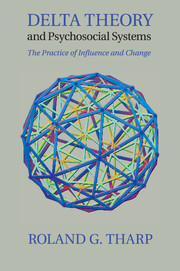Book contents
- Frontmatter
- Contents
- Figures
- Preface
- Acknowledgments
- Section One The Theory of Influence and Change
- Section Two The Practice of Influence and Change
- 7 Influencing and Change: Delta Theory of Practice
- 8 A Natural History Museum of Influence and Change
- 9 Who Influences? The Triadic Model of Influence and Change
- 10 Basic Tactics and Strategy in Designing Influence
- 11 Cultural Patterns in the Practice of Influence
- 12 Challenges, Research, and Future Development
- Appendix Criteria, Standards, and Guidelines Necessary for a Unified, Universal Theory
- References
- Index
12 - Challenges, Research, and Future Development
Published online by Cambridge University Press: 05 December 2011
- Frontmatter
- Contents
- Figures
- Preface
- Acknowledgments
- Section One The Theory of Influence and Change
- Section Two The Practice of Influence and Change
- 7 Influencing and Change: Delta Theory of Practice
- 8 A Natural History Museum of Influence and Change
- 9 Who Influences? The Triadic Model of Influence and Change
- 10 Basic Tactics and Strategy in Designing Influence
- 11 Cultural Patterns in the Practice of Influence
- 12 Challenges, Research, and Future Development
- Appendix Criteria, Standards, and Guidelines Necessary for a Unified, Universal Theory
- References
- Index
Summary
Delta Theory and Other Sciences: Relationships and Opportunities
Many social scientists are wary of drawing on physical science once again for visions of theory and method. On the other hand, had we paid more attention to their science’s development rather than on a fading Newtonian snapshot, all might have profited. My own use of physical science referents is intended as analogue, to allow a visual-conceptual alternative that illuminates certain key features of our domain. I do not suggest that we have – and I am agnostic as to whether we will have – any mathematical understanding equivalent to physical forces and their interplay. Biological rather than physical science models is a more relevant direct source of useful concepts and methods of inquiry.
Issues of Causation
Certainly lessons from the new physics, astronomy, and biology should give us comfort by their more complex view of causation. We have been well prepared for such a change by those in our own traditions, such as John Dewey, George Herbert Mead, and the symbolic interactionists, who decades ago held that causation is a process, and that in the long flow of events, variables and conditions alter their functions so that cause becomes outcome, and outcome cause. This view is indispensable to understanding a developmental process, and clearly influence and change is such.
- Type
- Chapter
- Information
- Delta Theory and Psychosocial SystemsThe Practice of Influence and Change, pp. 149 - 162Publisher: Cambridge University PressPrint publication year: 2011

